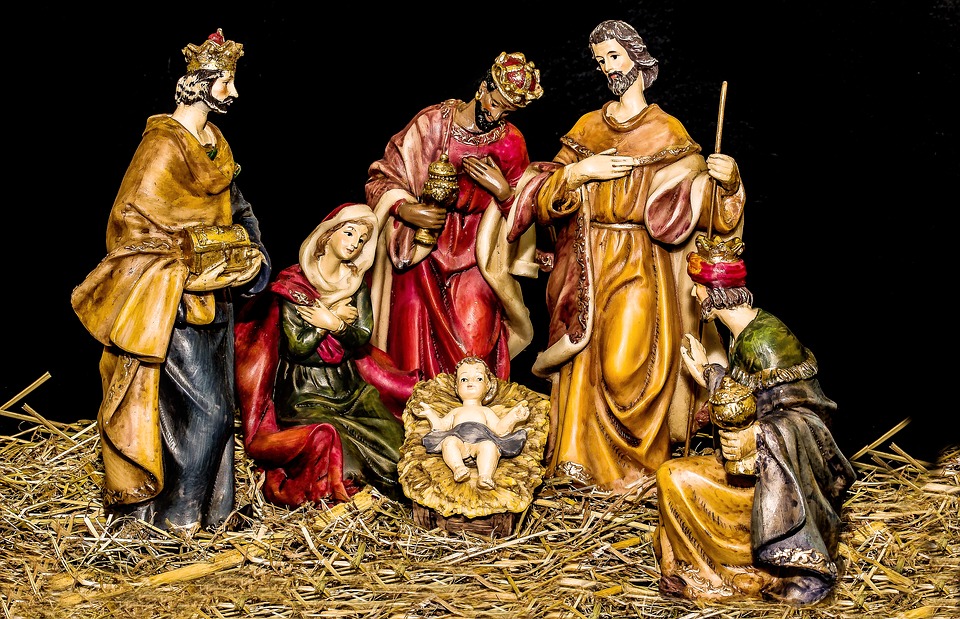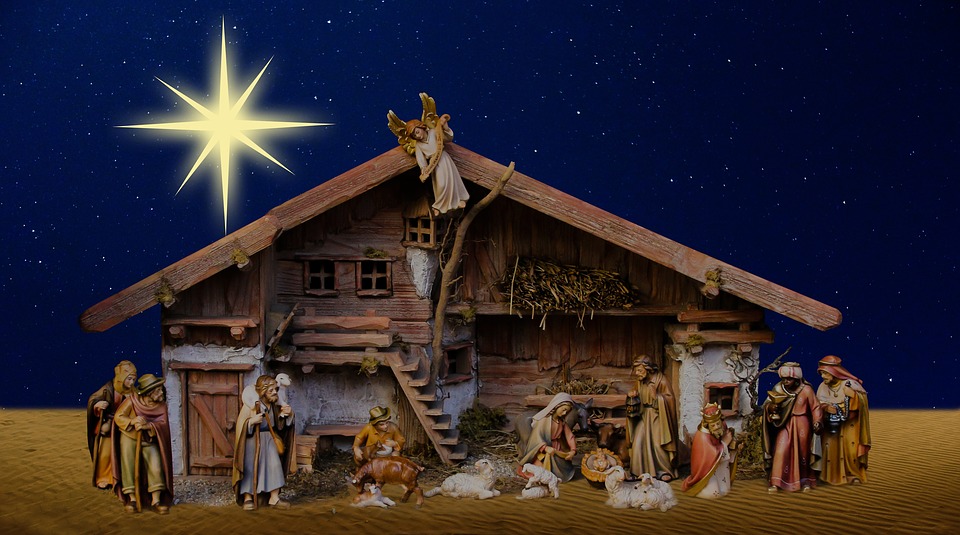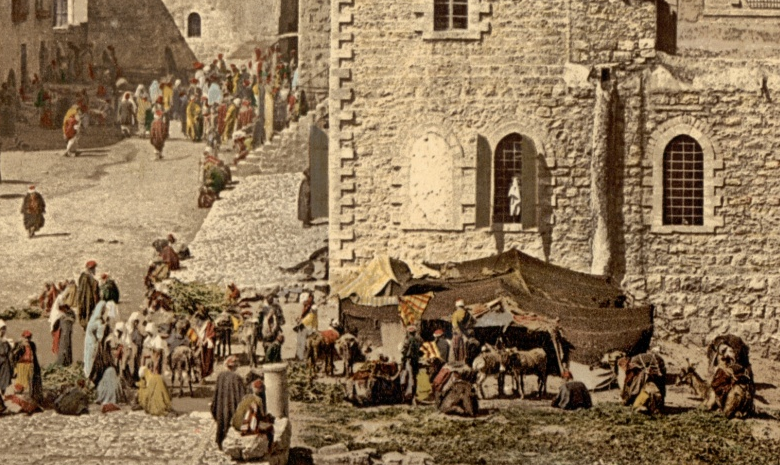
It seems every Christmas someone, a pastor, a friend, or a teacher, insists that the Nativity scenes and the common Christmas story are all wrong because Jesus had to have been a toddler by the time the wise men arrived in Bethlehem. Is this Biblical? I would like to answer this question once and for all, "How old was Jesus when the Wise Men came?"
There are two views on this question. The traditional view is that Jesus was a baby. I call this view the Wise Men/Baby Jesus view. The other view says that Jesus was one or two years old. I call this view the Wise Men/Toddler Jesus view.
The Wise Men/Toddler Jesus View
The Wise Men/Toddler Jesus view seems to have it roots in the actions of King Herod at the time of Jesus' birth. When the wise men came to him looking for the Messiah, he asked them when the star had appeared (Matthew 2:7).
The wise men went to visit Jesus and then returned home.
When Herod saw that they did not return to him as he had asked them to, he "was exceeding wroth, and sent forth, and slew all the children that were in Bethlehem, and in all the coasts thereof, from two years old and under, according to the time which he had diligently enquired of the wise men." (Matthew 2:16 KJV) Evidently, Herod figured that Jesus had to have been born at some time around when the star appeared or later.
The Wise Men/Toddler Jesus crowd agree with Herod's conclusion. They make three points in support of their view: 1) Jesus was born when the star appeared; 2) Jesus is called a young child (KJV) in the wise men account (Matthew 2:8,9,11,13,14,20,21) and not a baby; and 3) the wise men found Jesus in a house (Matthew 2:11), not a stable or an inn.
These points may sound plausible, but upon closer examination of the Bible and its underlying Greek text, some major problems emerge.

The Start of the Star
The Bible does not say that Jesus was born when the star first appeared. Those who say He was are only guessing.
Despite who Herod was, he did not know when Jesus was born. Just because he ordered that children two years old should be killed does not mean that Jesus was two years old at that time. Herod evidently also thought that Jesus could have been a newborn baby only days old because he also ordered newborn babies to be killed.
A Baby is Called a Young Child Too
The Greek word behind the term, young child, is paidion. It does not refer only to a toddler. It may also be a newborn baby. Paidion is used of John the Baptist when he was eight days old (Luke 1:59,66,76,80). It is used of Jesus when he was born (Luke 2:17), when he was eight days old (Luke 2:21), and when he was 40 days old (Luke 2:27,40). In fact, paidion is used of Jesus when the shepherds were there on the night of Jesus' birth (Luke 2:17), just one verse after babe (brephos) is used. So just because Jesus is called a young child (paidion) in the wise men account (Matthew) does not mean that he was older than a baby.
An Inn was a Room in a House
In the Bible times when people traveled, they stayed in homes as non-paying guests because hotels were very rare. There were no Holiday Inns or Motel 6s. The law commanded the Jews to treat strangers as themselves and not take advantage of them (Leviticus 19:33). It was wrong for them to charge money for travelers to spend the night. Because of this, it is highly unlikely that there was an inn in Bethlehem.
The term, inn, in the Bible can also refer to the guest room in a house. The Greek word for inn (kataluma) is only translated as inn in Luke 2:7. The other two times it appears (Mark 14:14 and Luke 22:11), it is translated as guest chamber (chamber is an old word for room) in the KJV. In those verses, it is obvious that it is a room in a house, not an inn.
Many people built guest rooms in their homes (usually as a second floor over their existing house with an external door and stairway) so that they could have a place for visitors to sleep, especially around Jerusalem. During Israel's three national holidays, Jews traveled from all over the country and lived in houses as non-paying guests in and around Jerusalem. Two of the holidays were a week long and so it required that the people with houses in Jerusalem and the surrounding cities be hospitable.
What is referred to as an inn in Bethlehem most likely was a guest room in someone's house. The guest room was full and so Mary and Joseph slept in the barn.
When the people in the guest room saw that Mary had given birth to Jesus, it is likely that someone offered to sleep in the barn so Mary and Jesus could sleep in the house. So the wise men could have come the day Jesus was born and found him in a house. The mention of a house does not require or hint that Jesus was not a baby.
But for argument's sake, let's say that everything in this section is wrong. There was an inn in Bethlehem and there was no room in the inn for Jesus. What form would this inn be in? A thirty story building able to sleep thousands with a big lighted sign on top that says, "Bethlehem Inn"? No. It was not in New York City in the twenty-first century. It was in Israel at the end of the BC era. They did not have skyscrapers. They had houses. If there had been an inn in Bethlehem, it would have been in a house, a house that the wise men came to. Again, the mention of a house does not require or hint that Jesus was not a baby.

The Wise Men Arrived in Jerusalem When Jesus Was Born
Another proof for the Wise Men/Baby Jesus view is Matthew 2:1. "Now when Jesus was born in Bethlehem of Judaea in the days of Herod the king, behold, there came wise men from the east to Jerusalem." (KJV) This verse states that the wise men came into Jerusalem "when Jesus was born". They did not come a year later. They came when he was born.
"When Jesus was born" is an aorist participle in Greek. It can be translated as "when Jesus was born", "after Jesus was born", or "Jesus was born and." Aorist participles are frequent in the New Testament. With an aorist participle, the action of the participle (Jesus was born) is closely followed by the action of the main verb (wise men came to Jerusalem). There was not a year or two or even a week or two between the time Jesus was born and when the wise men came into Jerusalem.
Bethlehem was only half a day’s walk from Jerusalem. It did not take the wise men long to get to Bethlehem after they arrived in Jerusalem when Jesus was born.
We Know When they Returned to Nazareth
Another proof for the Wise Men/Baby Jesus view is Joseph, Mary, and Jesus' return back to Nazareth. It only happened once and both the wise men account (Matthew) and the shepherd account (Luke) record it. In the shepherd account (Luke) it is very clear that they returned to Nazareth (Luke 2:39) very close to 40 days after Jesus was born, "when the days of her purification according to the law of Moses were accomplished" (Luke 2:22). The wise men account (Matthew) tells us that they returned to Nazareth after their return from Egypt (Matthew 2:22,23). So the wise men's visit, Joseph and Mary's trip to Egypt, and their trip back, all of it had to have happened within 40 days of Jesus' birth.

The Christmas Timeline
How did these events fit together? Here is a narrative that combines the two accounts in chronological order.
Mary and Joseph traveled to Bethlehem to be taxed. When they arrived, they went to Joseph’s relative's house. His relatives had a guest room, but the guest room was full, so they stayed in the barn.
Jesus was born at night in the barn. Angels appeared to shepherds telling them of Jesus' birth. They found Jesus lying in the feed trough of the barn. When they left, they told everyone what had happened. The news spread throughout that small village.
That night or the next morning Joseph's relative brought Mary and the baby into the house and kicked out some other distant relatives.
About this time the wise men entered Jerusalem asking where the Messiah was. Herod consulted the people whose job it is to copy the Old Testament by hand and they answered, Bethlehem. Herod asked the wise men to find the Messiah and then come back and tell him where the Messiah was.
The wise men left on the several hour trip to Bethlehem traveling in the cool of the night. The star reappeared and guided them to the house where Jesus was. They went into the house and gave him gifts.
As they slept that night, God warned them in a dream not to return to Herod but to go home a different way. They left.
The next night an angel appeared to Joseph in a dream and told him to escape to Egypt. He, Mary, and Jesus set off for Egypt. After a few days journey Mary and Joseph arrived in Egypt.
Herod saw that the wise men had not returned. He got mad and killed all of the boys in the Bethlehem area that were two years old and younger.
Joseph, Mary, and Jesus stayed in Egypt for about a month. Herod died. An angel appeared in Joseph's dream again telling him it is alright to return to Israel.
They traveled to Jerusalem and went to the temple to offer the sacrifices required by the law. Simeon and Anna recognized the baby Jesus as the Messiah.
The proper thing for them to have done next would have been to go back to Bethlehem, tell the relatives and friends there that they were alright, and thank them for their hospitality, but talking with other worshippers at the temple, Joseph found out that Herod's son, Archelaus, had replaced Herod, and he was afraid to go to Bethlehem. Nervous about the attention his Son was getting in Jerusalem, they took a back way out of the area and then headed north to Nazareth.
How old was Jesus when the wise men came? The Bible does not say exactly how old He was, but from what it says we can make a safe guess that He was from 0 days old to several days old. He was not one or two years old.
